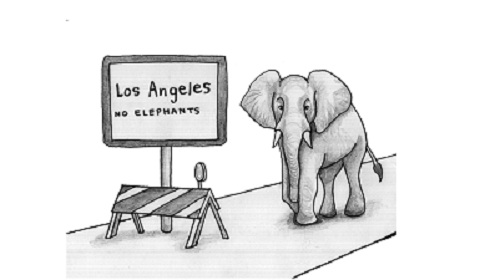
After being pressured by animal welfare advocates who disagree with the treatment of circus animals, the Los Angeles City Council began considering a measure proposed by councilman Paul Koretz on Nov. 20 that would ban elephants from performing in the Ringling Brothers and Barnum & Bailey circus as well as in other traveling shows and exhibitions in the city, or at the very least would ban bullhooks —the sharp instruments used to train elephants.
Councilman Koretz introduced and decided to sponsor the bill after seeing a video shot undercover of performing elephants being abused with bullhooks for no apparent reason. The other Council members were shocked at the treatment and the video caused many of them to side with animal rights groups like PETA (People for the Ethical Treatment of Animals) on this issue.
The audience at a circus may see elephants standing on large balls or balancing on their heads. Unfortunately, viewers only see the product of training, so the general public does not see how the animals are treated when it is not show time.
Animal rights group PETA describe on their website how performing elephants are moved from place to place in extremely small box cars or trucks, where they are chained for up to 100 hours to keep them from running wild and injuring anyone. Trainers use metal or wooden bullhooks, tools with a two or three foot handle attached to a hook, to strike elephants behind their ears, under their chins and on their legs, piercing the skin to the point of bleeding and often leaving scars. Animal activists say the trainers use bullhooks solely to establish dominance over the animals, not for any real training needs. The vast majority of elephant trainers in the circus use these bullhooks and occasionally use electrified prods, but zoo trainers are known to rely on gentleness and reward when institutionalizing them, according to the Los Angeles Times.
Alex ’15 said that when she was younger she saw elephants performing in the circus and remembers enjoying it but added, “I did not think about the abuse the animals might have been going through, and now that I know, I wouldn’t attend a circus with elephants again.”
However, the City Council has not yet decided how they want to deal with this issue. Although animal rights groups are urging them to pass the measure, the Council could potentially rid the city of hundreds of jobs by banning performing elephants. Adi ’14 proposed a solution to avoid any economic fallout from a potential ban.
“I think rather than banning elephants, they should put up laws and regulations concerning how elephants can be treated,” she said.
After banning pet stores from selling puppies, kittens and rabbits that come from breeders and puppy mills in an attempt to support animal shelters, Los Angeles has become a leader in a country-wide animal rights movement. Los Angeles Animal Services told animal rights group Care2 that the city’s goal should be to stop all animals from being forced to perform in the City of Angels, but City Council is set on making elephants the priority.



